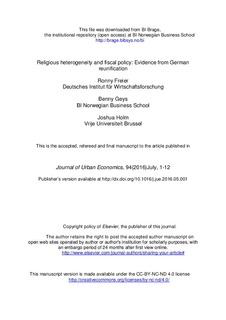Religious Heterogeneity and Fiscal Policy: Evidence from German Reunification
Journal article, Peer reviewed
Date
2016Metadata
Show full item recordCollections
- Publikasjoner fra CRIStin - BI [1015]
- Scientific articles [2173]
Original version
Journal of Urban Economics, 94(2016)July, 1-12 http://dx.doi.org/10.1016/j.jue.2016.05.001Abstract
Theoretical work based on social identity theory predicts that population diversity
undermines redistributive public policies. This article tests this proposition exploiting
an exogenous shock in diversity due to Germany's reuni cation. In contrast to previous
work on ethno-linguistic or racial heterogeneity, we speci cally analyze religious diversity,
which is an increasingly relevant social cleavage in many countries. Our main results corroborate
that increasing religious diversity leads to a change in scal policies in Bavarian
municipalities over the 1983-2005 period. Moreover, we nd some evidence of declining
individual-level local identi cation over the post-reuni cation period, which suggests that
the observed scal e ects are indeed linked to the theoretical mechanism of individuals'
social identi cation. Finally, we highlight an important mediating role for the democratic
process, since the observed scal e ects strengthen considerably following Bavarian municipalities'
rst local elections after the reuni cation migration wave (March 1996) and a legal
change allowing local referenda on public policies (October 1995).
Description
This is the accepted, refereed and final manuscript to the article
